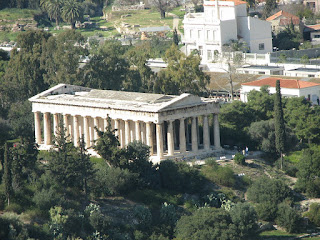











The current capital Greece took its name from the goddess Athena, the goddess of wisdom and knowledge. This is where democracy was born. The marvel of architecture, the Parthenon, was built on one of Athens' two hills. It was on Mars Hill that St Paul addressed the Athenians and Greek philosophers.
Remember we just left Corinth. Ancient Corinth was called 'wealthy' because of its commerce, since it lies at the Isthmus and controlled two harbors, one serving the East/Asia, the other serving the West/Italy. The sanctuary of Aphrodite was so wealthy that it possessed as slaves of the Temple, more than 1000 courtesans. By reason of them, the city was thronged and enriched by the sailors who spent their money easily, hence the proverb - "Not for every man is the voyage to Corinth".
The Parthenon at the Acropolis in Athens, Greece
Of course, the main attraction in Athens is the Acropolis. There is a 12 euro fee to gain entrance into the Acropolis and it is well worth it. You can easily spend several hours wandering around the various sites (and the museum) and still leave without seeing everything. The Parthenon is over 2,400 years old and still stands proud and tall to be seen from every vantage point in Athens. It is truly remarkable
The Erechtheion.
Another of the major buildings that reside on the Acropolis is the Erechtheion. This structure dates back centuries. While the 6 ladies that currently serve as pillars are reproductions, you can see 5 of the six original ladies in the Acropolis museum that is also located on the Acropolis behind the Parthenon a few meters away.
Theatre of Dionysos with Athens in the Background
As you work your way up to the entrance of the Acropolis, you pass the stunning Theater of Dionysos. One can't help but be in awe of this ancient masterpiece.
The Panathenaicon Stadium
The site of the first Olympiad, The Panathenaicon Stadium still stands and is also well worth a visit. One can view the Acropolis and Parthenon from this site and imagine the awe spectators must have felt when participating in the games.
Mars’ Hill In Athens, Greece
This limestone hill is situated between the Acropolis and the Agora. In Roman mythology Mars was the god of war; his counterpart in Greek mythology was Ares. Many translations of the Bible will use the word "Areopagus" instead of the phrase "Mars' Hill" when describing this location. The word "Areopagus" means "the hill of Ares."


No comments:
Post a Comment